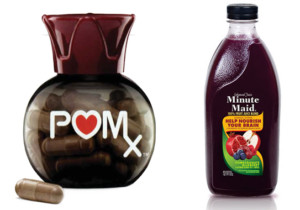
Best Reader Tips of 2021
This year reader tips led to dozens of ad alerts, as well as a complaint to regulators.
POM Wonderful is in court on two fronts this month, waging battle on issues that go to the heart of juicy product claims and labeling.
On one front, the Supreme Court is hearing arguments this week about POM’s claim that it has a right to sue competitor Coca-Cola for misleading consumers about Coke’s Minute Maid pomegranate and blueberry brand fruit juice that has less than one percent pomegranate and blueberry juice in it. At issue is whether POM, which makes 100 percent pomegranate juice beverages, can use the Lanham Act, which allows companies to sue other companies for false advertising, or whether FDA labeling regulations preclude such lawsuits because the regulations are the ultimate authority on such issues.

Coke maintains that its labeling of its very-little pomegranate-juice beverage is consistent with FDA regulations. POM may win this battle. According to recent reports, Coke’s defense that naming the product as “Pomegranate Blueberry Flavored” is consistent with FDA standards and that the FDA has to be the rule of the land on this issue has garnered some sharp rebukes from court justices. USA Today reported that Justice Sonia Sotomayor asked Coke’s attorney:
Why are you permitted to use it in a misleading way?
And Justice Anthony Kennedy said:
Don’t make me feel bad, because I thought that this was pomegranate juice.
Kennedy also said, according to reports in The New York Times:
If Coca-Cola stands behind this label as being fair to consumers then I think you have a very difficult case to make. I think it’s relevant for us to ask whether people are cheated in buying this product.
While POM may be winning this battle, and garnering consumer advocate support as it fights, it is far from consumer advocates’ favorite company. On the second court front, which also concerns pomegranates, POM is fighting a 2010 Established in 1914 under President Woodrow Wilson, the FTC is the United States government’s primary regulatory authority in the area of consumer protection and anti-competitive business practices in the marketplace. Its Bureau of Consumer Protection assumes the lead in the Commission’s efforts to eliminate deceptive advertising and fraudulent business practices at work in the economy. ruling ordering the company to stop making deceptive claims that its pomegranate juice and other pomegranate products could prevent, treat, or reduce the risk of an assortment of ailments including heart disease unless the claims can be supported by two randomized and controlled clinical studies. This battle is being waged in the D.C. U.S. Court of Appeals.
Said the FTC in a recent court filing:
POM’s account of the medical evidence routinely distorted the scientific record and omitted the negative results of POM’s own studies…POM has not substantiated any of its disease claims with positive results from even one well-controlled clinical trial.
POM says the FTC is violating its First Amendment rights and that its claims are based on acceptable science. Companies are watching this case closely because POM is contending the FTC is setting a new standard concerning clinical trails to back claims.
So, what’s the takeaway for consumers? Go POM. Go FTC.
UPDATE 3/22/16: The Supreme Court ruled in that POM’s suit against Coke could proceed but a California jury held that the juices’ labels weren’t misleading. POM also lost its battle against the FTC when the U.S. Court of Appeals upheld the agency’s false advertising claims against the company. The court also said one clinical trial may be enough to support advertising claims.
This year reader tips led to dozens of ad alerts, as well as a complaint to regulators.
It’s the perfect formula for a class-action lawsuit trend.
These marketing claims are feeling the heat.


